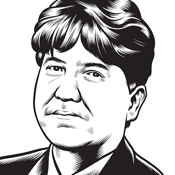A couple of winters ago, I had the opportunity to travel to Spokane, Washington, to interview the great Sherman Alexie just before the release of his latest book of poetry, Face. I was worn-out and deep into some dark winter months of making a record, and I couldn’t wait to cross the continent to refresh my inspiration by meeting one of the people whose art made me feel brave enough to try to write things down in my own words. The fact that Alexie was going to be on home turf was extra special in my mind. Eastern Washington was a place I called home for much of my life, so to return there meant a great deal to me. The fact is, there aren’t very many writers from Washington, and even fewer who speak the language of kids who grew up in poverty there, and probably less than a handful of those speak the poetry of our region. “Our” trees are not “their” trees, if you know what I mean.
Sherman Alexie is a Spokane Indian who grew up on the reservation in eastern Washington from the time of his birth, in 1966. He stayed on there through the early ’80s. Much of Alexie’s family still live on the Spokane reservation, and their hometown, Wellpinit, has been vividly created and re-created in many of his books, short stories, and poems.
Alexie’s first book, the story collection The Lone Ranger and Tonto Fistfight in Heaven (1993), quickly brought him international acclaim and established him as a powerful presence in American literature. One of the stories from that book, “This Is What It Means to Say Phoenix, Arizona,” was the basis for the screenplay of his widely acclaimed feature, Smoke Signals, which he also wrote. Alexie has published thirteen books of poetry, four novels, and four story collections, and has won many honors, including a National Book Award for Young People’s Literature for The Absolutely True Diary of a Part-Time Indian. His work has been translated into dozens of languages, including Swahili, Punjabi, Japanese, Hungarian, and Hebrew.
We met at a hotel restaurant in downtown Spokane, where we recorded this interview. Sherman then took me on a tour of the breathtaking Spokane reservation, as well as surrounding places of interest that feature prominently in his work. One highlight of the tour followed the next: I watched an emotional Alexie address a diverse and loving hometown crowd at a reading, then watched him speak one-on-one with some young students considered by the school system to be “at risk.” They told him to his face that The Absolutely True Diary made them hungry...
You have reached your article limit
Sign up for a digital subscription and continue reading all new issues, plus our entire archives, for just $1.50/month.
Already a subscriber? Sign in





